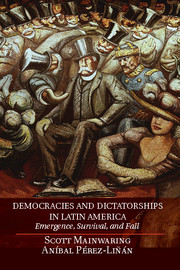Book contents
- Frontmatter
- Dedication
- Contents
- List of Tables
- List of Figures
- Acknowledgments
- 1 Introduction
- 2 A Theory of Regime Survival and Fall
- 3 Competitive Regimes and Authoritarianism in Latin America
- 4 Regime Survival and Fall
- 5 From Multiple Breakdowns to Stabilization of Democracy: Argentina
- 6 From Persistent Authoritarianism to a Durable Democracy: El Salvador
- 7 International Actors, International Influences, and Regime Outcomes
- 8 Political Regimes after the Third Wave
- 9 Rethinking Theories of Democratization in Latin America and Beyond
- Appendix 3.1 Coding Rules for Political Regimes
- Appendix 3.2 Coding U.S. Foreign Policy toward Democracy in Latin America
- Appendix 4.1 Long-Run Equilibrium for the Proportion of Competitive Regimes
- Appendix 5.1 Qualitative Comparative Analysis
- Appendix 6.1 Coding of Salvadoran Actors, 1979–2010
- Bibliography
- Index
9 - Rethinking Theories of Democratization in Latin America and Beyond
Published online by Cambridge University Press: 05 June 2014
- Frontmatter
- Dedication
- Contents
- List of Tables
- List of Figures
- Acknowledgments
- 1 Introduction
- 2 A Theory of Regime Survival and Fall
- 3 Competitive Regimes and Authoritarianism in Latin America
- 4 Regime Survival and Fall
- 5 From Multiple Breakdowns to Stabilization of Democracy: Argentina
- 6 From Persistent Authoritarianism to a Durable Democracy: El Salvador
- 7 International Actors, International Influences, and Regime Outcomes
- 8 Political Regimes after the Third Wave
- 9 Rethinking Theories of Democratization in Latin America and Beyond
- Appendix 3.1 Coding Rules for Political Regimes
- Appendix 3.2 Coding U.S. Foreign Policy toward Democracy in Latin America
- Appendix 4.1 Long-Run Equilibrium for the Proportion of Competitive Regimes
- Appendix 5.1 Qualitative Comparative Analysis
- Appendix 6.1 Coding of Salvadoran Actors, 1979–2010
- Bibliography
- Index
Summary
We began this book because we wanted to understand regime survival and fall in twentieth-century Latin America. As we studied these issues, we developed doubts about many theoretical approaches to understanding political regimes. It became essential to engage in a broader effort to theorize about the rise and fall of democracies and dictatorships.
Therefore, we developed a theory to explain the survival or fall of democracies and dictatorships. Starting from assumptions about how actors are constituted and what motivates them to join regime coalitions, we deductively derived five hypotheses about regime survival or fall. We particularly drew on three literatures: (1) transitions, breakdowns, and the survival of political regimes; (2) international factors in regime change and survival; and (3) the impact of ideas and beliefs on political outcomes. But we go beyond most of the existing work in these literatures by articulating an integrated theory and testing it in new ways. We believe that this theory is more realistic than competing theories; that there are benefits to systematizing it as a theory; and that it explains regime change and survival in twentieth-century Latin America better than alternative theoretical explanations.
This chapter undertakes three main tasks. First, we summarize our theoretical arguments and contributions. Our theory is based on more realistic microfoundations than most alternatives, and it has stronger empirical support. In addition, we devised an original research strategy to test hypotheses about actors across a much broader range of countries and time than previous actor-based theories. We also articulate our contributions to the literatures on actors’ normative regime preferences, their policy radicalism or moderation, and international influences on regime outcomes.
- Type
- Chapter
- Information
- Democracies and Dictatorships in Latin AmericaEmergence, Survival, and Fall, pp. 269 - 296Publisher: Cambridge University PressPrint publication year: 2014



